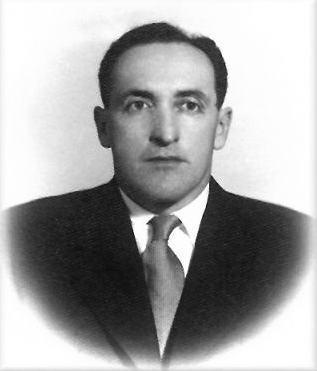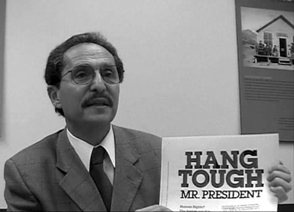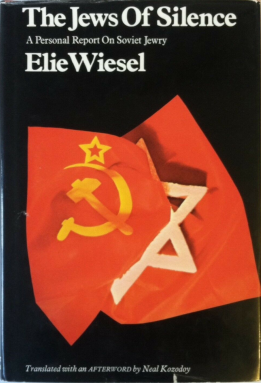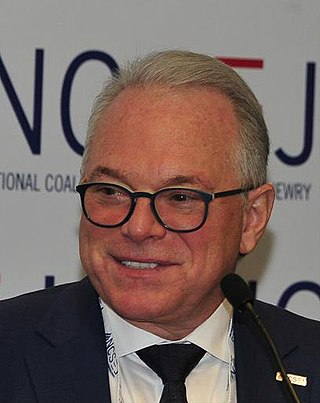
The Jewish Defense League (JDL) is a far-right religious and political organization in the United States and Canada. Its stated goal is to "protect Jews from antisemitism by whatever means necessary"; it has been classified as "right-wing terrorist group" by the Federal Bureau of Investigation (FBI) since 2001, and is also designated as hate group by the Southern Poverty Law Center. According to the FBI, the JDL has been involved in plotting and executing acts of terrorism within the United States. Most terrorist watch groups classify the group as inactive as of 2015.
The American Jewish Committee (AJC) is a civil rights group and Jewish advocacy group established on November 11, 1906. It is one of the oldest Jewish advocacy organizations and, according to the New York Times, is "widely regarded as the dean of American Jewish organizations".

The Religious Action Center (RAC) is the political and legislative outreach arm of Reform Judaism in the United States. The Religious Action Center is operated under the auspices of the Commission on Social Action of Reform Judaism, a joint instrumentality of the Central Conference of American Rabbis and the Union for Reform Judaism. It was founded in 1961.

Nehemiah Levanon was an Israeli intelligence agent, diplomat, head of the aliyah program Nativ, and a founder of kibbutz Kfar Blum. Originally a native of Latvia, he immigrated to the Mandatory Palestine in 1938. After Israel's independence in 1948, Levanon served in a variety of roles to encourage the well-being and emigration of Soviet Jewry. Due to the covert nature of his work, Levanon's decades of service were largely unknown until after his retirement, during the last days of the Soviet Union.

Malcolm Hoenlein was the executive vice chairman of the Conference of Presidents of Major American Jewish Organizations from June 1986 until 2019. He was succeeded by William Daroff. He is the founding executive director of the Greater New York Conference on Soviet Jewry and the Jewish Community Relations Council of New York.
Jacob (Yaakov) Birnbaum was the German-born founder of Student Struggle for Soviet Jewry (SSSJ) and other human rights organizations. Because the SSSJ, at the time of its founding, in 1964, was the first initiative to address the plight of Soviet Jewry, he is regarded as the father of the Movement to Free Soviet Jewry. His father was Solomon Birnbaum and grandfather Nathan Birnbaum.
The Student Struggle for Soviet Jewry, also known by its acronym SSSJ, was founded in 1964 by Jacob Birnbaum to be a spearhead of the U.S. movement for rights of the Jews in the Soviet Union. The organisation held demonstrations, at various important locations.
Joseph Schechtman was a Russian-born Revisionist Zionist activist, historian, and author. He played a significant role in the establishment of the World Union of Revisionist Zionists and the New Zionist Organization alongside Ze'ev Jabotinsky. Schechtman authored numerous works on Jewish history, Zionism, and population migrations, including The Arab Refugee Problem and European Population Transfers, 1939–1945. His studies on population transfers, described as "pioneering" in defining guidelines for such movements, have been both influential and controversial. He emigrated to the United States during World War II, continuing his advocacy and scholarship while working with organizations such as the Jewish Agency for Israel and the Office of Strategic Services (OSS).
The Soviet Jewry movement was an international human rights campaign that advocated for the right of Jews in the Soviet Union to emigrate. The movement's participants were most active in the United States and in the Soviet Union. Those who were denied permission to emigrate were often referred to by the term Refusenik.

UJA-Federation of New York is the largest local philanthropy in the world. Headquartered in New York City, the organization raises and allocates funds annually to fulfill a mission to “care for Jews everywhere and New Yorkers of all backgrounds, respond to crises close to home and far away, and shape our Jewish future.”
The National Coalition Supporting Eurasian Jewry (NCSEJ), formerly the National Council for Soviet Jewry (NCSJ), is an organization in the United States which advocates for the freedoms and rights of Jews in Russia, Ukraine, Belarus, the Baltic States, and Eurasia. Emerging from the American Jewish Conference on Soviet Jewry, now with a paid staff, it played an important role in the Soviet Jewry movement, including such landmark legislation as Jackson–Vanik amendment. Headquartered in Washington, D.C., it is now an umbrella organization of about 50 national organizations and 300+ local federations, community councils and committees.

David Alan Harris is an American political activist who served as the CEO of the American Jewish Committee (AJC), from 1990 to 2022. During his tenure, AJC became a global organization and began quiet engagement with countries in the Arab world, laying the groundwork for the Abraham Accords. For his role in international diplomacy, former Israeli Prime Minister Shimon Peres called Harris "the foreign minister of the Jewish people."
Freedom Sunday for Soviet Jews was the title of a national march and political rally that was held on December 6, 1987 in Washington, D.C. An estimated 200,000 participants gathered on the National Mall, calling for the General Secretary of the Communist Party of the Soviet Union, Mikhail Gorbachev, to extend his policy of Glasnost to Soviet Jews by putting an end to their forced assimilation and allowing their emigration from the Soviet Union. The rally was organized by a broad-based coalition of Jewish organizations. At the time, it was reported to be the "largest Jewish rally ever held in Washington."

The sociology of Jewry involves the application of sociological theory and method to the study of the Jewish people and the Jewish religion. Sociologists are concerned with the social patterns within Jewish groups and communities; American Jewry, Israeli Jews and Jewish life in the diaspora. Sociological studies of the Jewish religion include religious membership, ritual and denominational patterns. Notable journals include Jewish Social Studies, The Jewish Journal of Sociology and Contemporary Jewry.

Morey Schapira is a Silicon Valley High Tech executive and Soviet Jewry activist leader.
Jerry Goodman was a leading activist in the Soviet Jewry Movement and the founding executive director of the National Conference on Soviet Jewry, a national agency established to coordinate the efforts of the American Jewish communities on behalf of Jews in the Soviet Union. He co-established the organization in 1971 and directed it until 1988. Prior to creation of the National Conference, Goodman was Director for European Affairs at the American Jewish Committee and helped coordinate the American Jewish Conference on Soviet Jewry that was later restructured and renamed to National Conference on Soviet Jewry. Goodman acted as a consultant to the U.S. Congress in creating the Commission on Security and Cooperation in Europe and helped the passing of the Jackson-Vanik Amendment, a 1974 provision in United States federal law intended to restrict U.S. trade relations with USSR. He was one of the coordinators of the 1987 Freedom Sunday for Soviet Jews, the largest human rights national manifestation for Soviet Jews in the history of the Soviet Jewry movement.
Louis Rosenblum was a pioneer in the movement for freedom of emigration for the Jews in the Soviet Union, was a founder of the first organization to advocate for the freedom of Soviet Jews, the Cleveland Council on Soviet Anti-Semitism, founding president of the Union of Councils for Soviet Jews, and a research scientist at the National Aeronautics and Space Administration (NASA) Lewis Research Center.

The Jews of Silence: A Personal Report on Soviet Jewry is a 1966 non-fiction book by Elie Wiesel. The book is based on his travels to the Soviet Union during the 1965 High Holidays to report on the condition of Soviet Jewry. The work "called attention to Jews who were being persecuted for their religion and yet barred from emigrating."

Alexander Smukler is a Soviet-born American businessman, who is the chairman of the board of Agroterminal LTD and the chairman of the board of Century 21: Russia, Kazakhstan, and Ukraine. He is a former managing partner of Ariel Investment Group, which develops commercial enterprises and civil engineering projects in Russia.
Soviet Jews in America or American Soviet Jews are Jews from former Soviet Republics that have emigrated to the United States. The group consists of people that are Jewish by religion, ethnicity, culture, or nationality, that have been influenced by their collective experiences in the Soviet Union. In the 60s, there were around 2.3 million Jews in the USSR, as ethnicity was recorded in the census. Jews from the Soviet Union consisted mostly of the Ashkenazi sect, and emigrated in waves starting in the 1960s, with over 200,000 leaving in the 1970s. As of 2005, over 500,000 Jews had left Soviet Republics for the United States. American Soviet Jews are often covered by the blanket term, "Russian-speaking Jews", and are a self-selecting group, due to the barriers that people leaving the USSR had to face. Often-times, Soviet immigrants struggle with the abundance of choices that they can make in America, but after learning the language, have been shown to be as well-adjusted as other immigrant groups.











